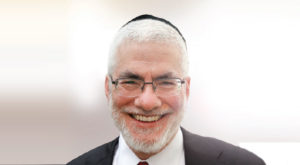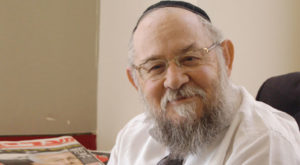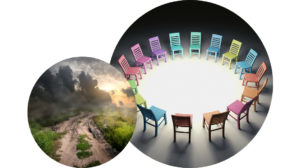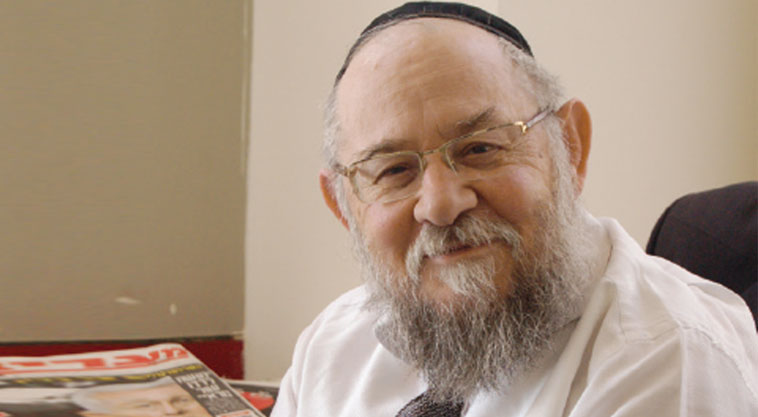Meeting in the Middle

Treasure your traditions and respect mine, too

True, many of us are busy learning the halachos of shemiras halashon and have become especially sensitive in the individual personal sphere. But what about the klal? Are we as generous when it comes to the “excitement” of public machlokes?
These weeks leading up to Tishah B’Av are an especially meaningful time for Am Yisrael. Speakers and writers keep reminding us that the second Beis Hamikdash was destroyed because of sinas chinam. We’re hearing plenty about the crucial importance of loving each other, of unity, as the formula for Geulah. Skillfully wielded, these words stir our hearts. They make us want to do better. Only trouble is, we heard these same things last year, and the year before, and ten or twenty years ago… and very little has actually changed in the love and unity department.
Yes, these derashos are critically important, but they seem to have only a fleeting effect. The old divisions still remain, the old resentments still simmer, while new ones appear daily, and we aren’t exactly seeing a mass movement of conciliation — people setting aside differences for the sake of brotherhood, goodwill, and cooperation. Lashon hara, rechilus, public shaming, and smearing run rampant, and ironically, the people who foment all this ill feeling will often be found pontificating about the importance of shalom and quoting Chazal on the destructive power of sinaas chinam.
For those unwilling to stay stuck in these destructive patterns, I highly recommend the short seforim put out by the Tzfas-based Machon Toras HaAdam L’Adam on various aspects of relating to one’s fellowman, as an excellent way of awakening the heart to the tragic import of machlokes, quarreling, and strife and the danger they pose to our nation, both physically and spiritually.
Still, we must happily acknowledge that much has improved on the level of one-on-one interpersonal relations. Over the years, there’s been a tremendous surge in the regular study of hilchos shemiras halashon, and that zechus belongs mainly to the women and girls of our nation. At this time every year, the days of bein hameitzarim, we see an increase in the study of these halachos, spurred by the calls of our spiritual guides to learn Sefer Chofetz Chaim in depth — and the effect on our lives is clear to see. Yet at the same time, on the community level, the rifts and the quarreling continue.
The Ponevezher Rav, Rav Yosef Shlomo Kahaneman ztz”l, sadly quipped that, “To this day, two things remain with us since the Churban: the Western Wall and sinas chinam.”
The question is, what can we simple Jews, who have little public influence, do to shift this state of affairs? Answer: Aside from correcting ourselves, we can do very little.
But there is one channel that is open to us, where we can exert real influence: We can refuse to be dragged into the quagmire.
Sad to say, the situation arises repeatedly. We hear of various camps causing deep rifts among us, but we know we’re not looking at ideological differences or incisive debates about how we choose to serve Hashem. (Do any the machlokes-makers even care about these things?) We’re looking at divisiveness led by political entities, as if we’d already shaken off the traumas of the past and learned nothing from them.
In recent years some peace has been achieved, and the factions have somehow learned to coexist. But there are those who keep bringing up the divisiveness in one form or another, those who would like to drag us all back into that whirlpool of machlokes, leaving families divided and the flames of hatred devouring all that’s been achieved.
We simple Jews aren’t really interested in who is “right” or who wins in these arguments. Let them work out their differences, go to mediation, intervention, arbitration, or whatever. But leave us out of it. We want no part of it, and we won’t be dragged into those dark pits they’ve dug. We want the peace that’s been achieved to continue. Let’s not underestimate our power: They will listen to us as to the voice of Hashem if we speak up loud, clear, and strong.
If we, regular people of conscience, use every channel of communication in these days of bein hameitzarim to make a statement that we refuse to be drawn into tangential fights, this small contribution from each of us can become a mighty stream that will turn the tide of needless discord, machlokes, and sinas chinam. It’s up to us.
WITH THESE THOUGHTS IN MIND, I was struck by a midrash on last week’s parshah. The midrash tells us that in the middle of Bilaam’s argument with his donkey, after Bilaam declared he would kill her if only he had a sword handy, the animal turned to him and said, “You can’t even kill me, a dumb donkey, unless you have a sword in your hand, so how do you expect to uproot an entire nation?” Bilaam had no answer to this.
The midrash goes on to say, “The stupidest of animals defeated the most intelligent of men. Once she had spoken, he could not stand against her.” And then it adds something astounding:
“The donkey died, because HaKadosh Baruch Hu had compassion on the honor of that rasha, lest people say, ‘That is the one that chased Bilaam away.’ And if HaKadosh Baruch Hu has compassion on the honor of a rasha, needless to say He has compassion on the honor of a tzaddik” (Yalkut Shimoni 565, 22).
These are shocking words. HaKadosh Baruch Hu had compassion on the honor of that rasha — the rasha who was on his way to curse Hashem’s People, in defiance of G-d’s explicit command. What a powerful lesson for us regarding the honor we owe to every human being, even the lowliest of men, simply because they have a tzelem Elokim.
Clearly, each community within Torah Jewry has the right — and even the duty — to preserve and inculcate its own traditions. But this doesn’t give others the right to speak negatively about, behave improperly toward, or belittle those who don’t conform to those particular traditions. So let’s take another lesson from Bilaam: When he looked down on the Jewish camp, he was inspired to utter the words we say every day — “Ma tovu ohalecha Yaakov...” Rashi explains that he saw how the tents were situated in a way that no one could look into the other’s dwelling. Rebbe Nosson of Breslov, in quoting his rebbe, Rebbe Nachman, extrapolates: Not only did they not look into one another’s homes, they didn’t “look” into one another when it came to their spiritual growth either. In other words, we shouldn’t be busy checking the level or spiritual state of others, but rather keep to our own “tent” and grow from the individual set of circumstances with which Hashem fitted each of us. Let’s stop checking and start accepting.
(Originally featured in Mishpacha, Issue 867)
Oops! We could not locate your form.










